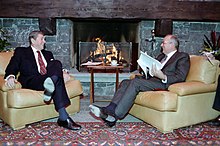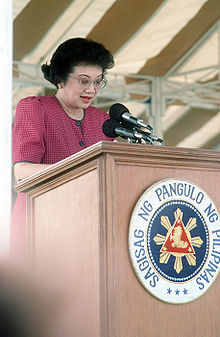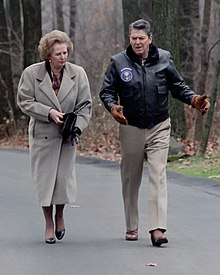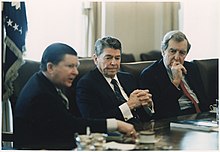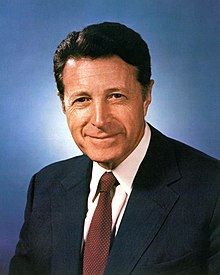Foreign policy of the Ronald Reagan administration
He and Thatcher provided mutual support in terms of fighting liberalism, reducing the welfare state, and contronting the Soviet Union in what turned out to be the final years of the Cold War.
[6] Reagan ultimately departed from the historical policy of détente with the Soviet Union, which had been followed after World War II by consecutive U.S. presidents, including Richard Nixon, Gerald Ford, and Jimmy Carter.
[citation needed] In a famous address to the National Association of Evangelicals on March 8, 1983, he called the Soviet Union an "evil empire" that would be consigned to the "ash heap of history".
[42] Reagan's new priorities enabled the effective effort by Congressman Charles Wilson (D-TX), aided by Joanne Herring, and CIA Afghan Desk Chief Gust Avrakotos to increase the funding for Operation Cyclone.
Reagan sold Pakistan attack helicopters, self-propelled howitzers, armoured personnel carriers, 40 F-16 Fighting Falcon warplanes, nuclear technology, naval warships, and intelligence equipment and training.
The letter noted "persistent reports from Amnesty International and other organizations of human rights violations" and asked the president "to add the plight of the people of East Timor to [his] agenda.
The Holy See named Archbishop Pio Laghi as the Vatican's first Apostolic Nuncio (equivalent to ambassador) to the U.S.[72] A coalition of Protestant groups responded by filing a lawsuit to nullify this diplomatic relationship, claiming it violated the separation of church and state.
U.S. officials feared that an Iranian victory would embolden Islamic fundamentalists in the Arab states, perhaps leading to the overthrow of secular governments—and damage to Western corporate interests—in Saudi Arabia, Jordan, and Kuwait.
[citation needed] The second Reagan term ended on what many Israelis considered to be a sour note when the United States opened a dialogue with the Palestine Liberation Organization (PLO) in December 1988.
But, despite the US–PLO dialogue, the Pollard spy case, and the Israeli rejection of the Shultz peace initiative in the spring of 1988, pro-Israeli organizations in the United States characterized the Reagan administration (and the 100th Congress) as the "most pro-Israel ever", and praised the positive overall tone of bilateral relations.
[citation needed] The attempts of certain members of the White House national security staff to circumvent Congressional proscription of covert military aid to the Contras ultimately resulted in the Iran-Contra Affair.
Two members of administration, National Security Advisor John Poindexter and Col. Oliver North worked through CIA and military channels to sell arms to the Iranian government and give the profits to the contra guerillas in Nicaragua, who were engaged in a bloody civil war.
On April 1, the National Security Council (NSC) decided to expand the administration's initial arms package to include five AWACS surveillance planes, the most advanced of their kind in the world.
[88] Through his terms Reagan supported the anti-communist regimes of Guatemala and El Salvador and the Contra rebels in Nicaragua, as well as democratic transitions of power in Bolivia (1982), Honduras (1981), Argentina (1983), Brazil (1985), Uruguay (1984), and Suriname (1987).
"[94] The Reagan administration lent logistical, financial, and military support to the Contras, based in neighboring Honduras, who waged a guerrilla insurgency in an effort to topple the Sandinista government of Nicaragua (which was headed by Daniel Ortega).
The article also talks about the "tremendous irony that President George W Bush [was] chosen to visit El Salvador on the anniversary of the murder of the country's Archbishop, Óscar Romero, 22 years ago.
[130] Given José Efraín Ríos Montt's staunch anticommunism and ties to the United States, the Reagan administration continued to support the general and his regime, paying a visit to Guatemala City in December 1982.
According to a BBC documentary titled "The Falklands War and the White House",[145] Caspar Weinberger's Department of Defense began a number of non-public actions to support and supply the British military while Haig's shuttle diplomacy was still ongoing.
The most important NATO contributions were intelligence information and the rescheduled supply of the latest model of Sidewinder Lima all-aspect infra-red seeking missiles, which allowed existing British stocks to be employed.
Margaret Thatcher stated that "without the Harrier jets and their immense manoeuvrability, equipped as they were with the latest version of the Sidewinder missile, supplied to us by U.S. Secretary of Defense Caspar Weinberger, we could never have got back the Falklands."
Lehman stated that the loan of the Iwo Jima was made in response to a request from the Royal Navy, and it had the endorsement of U.S. President Ronald Reagan and U.S. Secretary of Defense Caspar Weinberger.
[152][153][154] To preserve its joint Australian-US military communications facilities, the Reagan administration also had to assure the Hawke Government that those installations would not be used in the Strategic Defense Initiative project, which the Australian Labor Party strongly opposed.
Following the US's suspension of defence and intelligence cooperation with New Zealand in February 1985, the Australian government also endorsed the Reagan administration's plans to cancel trilateral military exercises and to postpone the ANZUS foreign ministers conference.
The Broomfield Bill also included an amendment added by the Democratic Congressman Stephen J. Solarz that would allow the U.S. president to restore the ANZUS relationship if NZ modified its nuclear-free policy.
[165] The Heritage Foundation and the United States Information Service also unsuccessfully tried to influence New Zealand public opinion in favor of supporting the resumption of ANZUS ties by sponsoring trips to the US by sympathetic journalists, politicians, and academics.
[168] The Reagan administration offered covert aid to the National Union for the Total Independence of Angola (UNITA), a group of anti-communist and pro capitalist fighters led by Jonas Savimbi, whose attacks were backed by South Africa and the US.
When South African Anglican bishop Desmond Tutu won the Nobel Peace Prize for his efforts to eliminate apartheid, Reagan received him in late 1984, congratulated him, but reiterated his policy of constructive engagement.
[179] By summer Congress was pushing for sanctions, so Reagan decided to preempt congressional action and make an "abrupt reversal" by issuing on September 9 Executive Order 12532 prohibiting some kinds of bank loans to the apartheid government and imposing an arms embargo.
[193] The United States Holocaust Memorial Museum and the textbook of Oxford University Human Rights explained the sudden ratification as a direct response to the Bitburg controversy and an attempt for Reagan to "make amends" for the visit.
[194][195] On April 6, 1984, the United States attempted to modify its declaration accepting the compulsory jurisdiction of the International Court of Justice, in order to exclude disputes involving Central America for a period of two years.
